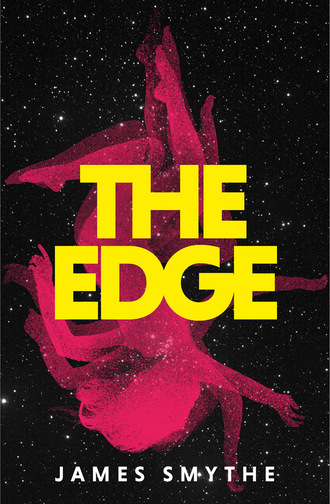
The Edge

THE EDGE
Book Three of The Anomaly Quartet
James Smythe

Copyright
HarperCollinsPublishers
1 London Bridge Street
London SE1 9GF
www.harpercollins.co.uk
HarperCollinsPublishers
1st Floor, Watermarque Building, Ringsend Road
Dublin 4, Ireland
First published in Great Britain by HarperCollinsPublishers 2021
Copyright © James Smythe 2021
Cover design by Mike Topping © HarperCollinsPublishers Ltd
Cover images © Shutterstock.com
James Smythe asserts the moral right to be identified as the author of this work.
A catalogue copy of this book is available from the British Library.
This novel is entirely a work of fiction. The names, characters and incidents portrayed in it are the work of the author’s imagination. Any resemblance to actual persons, living or dead, events or localities is entirely coincidental.
All rights reserved under International and Pan-American Copyright Conventions. By payment of the required fees, you have been granted the non-exclusive, non-transferable right to access and read the text of this e-book on screen. No part of this text may be reproduced, transmitted, down-loaded, decompiled, reverse engineered, or stored in or introduced into any information storage and retrieval system, in any form or by any means, whether electronic or mechanical, now known or hereinafter invented, without the express written permission of HarperCollins.
Source ISBN: 9780007541867
Ebook Edition © November 2020 ISBN: 9780007541850
Version: 2020-11-30
Contents
Cover
Title Page
Copyright
Chapter 0
Part One
Chapter 1
Chapter 2
Chapter 3
Chapter 4
Chapter 5
Part Two
Chapter 6
Chapter 7
Chapter 8
Chapter 9
Chapter 10
Chapter 11
Chapter 12
Part Three
Chapter 13
Chapter 14
Chapter 15
Chapter 16
Acknowledgements
About the Author
Also by James Smythe
About the Publisher
0
I walk the station, and I go to see Snipes; and he is in pain. He is in such pain, and that has been so clear from the start. A person who wasn’t made for this; who wanted to be so much more. An experimental pilot, he said the night we met, the night he came up here; a joke we made about his job. I’m an engineer. Just an engineer. His hand on my arm. Maybe we could be something; in another life, maybe.
He paces his room, frantic. He says, ‘I didn’t want you to see me like this,’ but I tell him that I don’t mind, that I just want to help.
It’s early in the morning, or late at night. The same state, really. Just different perceptions; we set the clock ourselves. And he says, a variant on the last: ‘I didn’t want to have to see you, not right now.’
‘Please,’ I say to him, but he doesn’t listen. He doesn’t, because he’s made a choice.
He leaves his room, and he climbs down the ladder to the main section of the station, and he heads around it as if he’s already late.
I chase him. I message the others, to tell them what’s happening, that I might need help. He stops, shouts at me. ‘Please, Ali,’ he says, ‘let me do this.’
Then he’s into the changing rooms, and the airlock.
‘Please help,’ I ask the others, ‘please help,’ but nobody comes in this moment, and there’s nobody coming at all; so I think, I’ll pull the alarm, but Snipes is too fast, too driven.
He’s got permissions; he can do what he likes to the systems.
We didn’t have anything between us; we nearly did, that’s all. But neither of us was in a place to begin anything—
He starts the airlock cycle. One door opening, and he steps inside.
Another door opening, and he’s gone.
His hand lingers on the internal window, for just a moment. It holds, blocking my view, as if he’s reaching for me—
Outside, I see Earth. That’s where we are in this part of our rotation. Facing away from the Anomaly.
His trajectory: home.
I feel my heart leap, or sink, or crush or be pulled apart; I watch him go. It’s so cold—
I feel myself pulled along in his wake. I would be—
The others get here, finally, and they rush and crowd, and desperately try to fix this.
Mon helps me away, ushers me to my room, where she quiets me. Shhh, she says. Hand on my head, brushing my hair back, comforting me; restraining me.
Go to sleep, she says. This’ll help you, sleep now.
A sleep. A chance to reset myself, and to feel better, and to move on.
PART ONE
It seems, as one becomes older,
That the past has another pattern, and ceases to be a mere sequence.
T. S. Eliot, Four Quartets
1
Theo, my son, is five years old, or a little over; the exact number of days gets looser when you pass the easily definable. Until they’re two, of course, you count them by months; or even weeks, when they’re younger.
Then they cross a boundary, and suddenly: it’s thereabouts. Two and a half; nearly four; five, until they’re six.
My connection with Theo is purely digital. Screen to screen. The comms link with Earth is terrible, but usually it’s enough for a picture, even if it’s low res. To see his smile, hear his voice, that’s everything to me. That tells me that there is a reason for my doing this.
After I have asked him about his day, about his life, and told him about mine, I tell him that I love him, and he says the same to me – he isn’t yet old enough to really understand what it means, but he knows that there’s a call and response to these things, and he says it the same way, every single time, as if it’s rehearsed; even though I can tell he feels it, I can see it in his eyes – and then we say goodbye. Sometimes our conversation runs its course; sometimes it’s halted because of the connection being tenuous up here; sometimes he’s late for school, or his father has decided to take him out at the exact moment that he knows I’ll be calling. But at least we speak, and have spoken nearly every day since I came up here; even if our conversations are only brief.
I think, on those days, that I work better. I am more efficient. I am focused, and I channel my feelings into my understanding that, more than anything else in the world, I want to get off this godforsaken station.
Last night one of my only real friends up here killed himself. His name was Snipes, and I hadn’t known him for long. It feels stupid to get caught up in it, in missing him, or feeling the pain of his being gone; the burn of it. And already, his face is fading a little. As if it’s not quite been impressed hard enough. The short time that I knew him, that wasn’t enough to make it permanent.
But still, he ended it. He was sent up here to die, anyway. His death was inevitable.
He just wanted to control it, I suppose.
We buried him. Except, here it’s not a burial. It’s a send-off. So much less important-sounding, so much less gravitas.
This morning, more than any other day since I’ve been up here, I want to speak to my son. This morning, still hungover from the sadness of last night, I need Theo’s voice, his gaze. I need that moment of connection; of clarity.
I get a connection straight away. Sometimes we don’t get to speak, because the comms are out, or because our cycles don’t overlap. Sometimes I call, but there’s no answer. Those days, it’s impossible to not fear the worst. In any situation where you truly feel for somebody, it’s natural to worry when you cannot make contact with them; and when they’re your child that feeling is amplified. But today, the connection works. There’s static on the picture, and that’s fine. Better than nothing. Xavier answers, and he smiles at me. He wears a very different smile than he wore when we were actually together. It looks the same, because that’s his face, but God knows that whatever is happening in the space behind it is a very different thing.
‘Allanah,’ he says. He’s the only person who still uses my full name. I’ve been Ali for as long as I can remember. Xavier uses my full name because he thinks it gives him the upper hand, or power. This unbearably petty aggression, this absolute smugness. Arrogance that was there before this, long before the upper hand he felt he held; that he is Down There and I am not.
Because, as he reminds me, to hurt me, I left, and Xavier remained.
As soon as he sees me he hoists Theo up into the air in front of him, holding him out to the camera, pushed forward. ‘Can you see?’ he asks. Theo has one of the knots on a necklace around his neck, like a cross, at first glance; a cross mixed with an ampersand, to make this tied-off symbol, looped and knotted together. ‘He picked this one out himself,’ Xavier says.
‘No he didn’t,’ I say. ‘He doesn’t know what that even means. He’s too young.’
‘I don’t think you can ever be too young to have faith, Allanah. He’s got faith, just like I do. You wouldn’t believe what it’s like down here, now. Even in the short time you’ve been gone, it’s so different. Belief in the knot is intrinsic. You’d understand if you were here, I’m sure you would.’
‘I don’t think so,’ I say. He smiles dismissively. I wave at Theo and he waves back. My little boy; growing older every day, without me there to see it. ‘Let me talk to him, on our own.’ As I speak, my head swims. Being up here, it fucks with you. There’s a strange pressure in the station, a sense of the air not being quite right. Headaches, bone aches, cramps in your gut: they’re all part and parcel of your stay on the station. They told us that on day one. ‘Take it off him, please. If you don’t, I’ll tear it off as soon as I see him.’
‘Come on,’ Xavier says, ‘there’s no need for that.’ Xavier’s got a necklace of his own, and I see it as he shifts Theo’s weight in his arms: his is thicker, silver rope tied around itself; a tangled ball that has only a passing resemblance to a crucifix now. ‘Anyway, it’s not like I forced it on him. He wanted one.’
‘Because you wear one, and he wanted to be like you.’
‘Invoke the truth and make it a reality,’ Xavier says. It’s one of his church’s platitudes: a phrase that means nothing, torn from some quasi-life-coach little blue book and turned into a commandment. Seize the day, and make it yours. But it’s a creed that Xavier’s lived by long before the knot came along. ‘We both wanted to talk to you today, anyway.’ His smile is so weak and ineffectual. I picture it plastered to his face while he sleeps, while he dreams whatever he has been told to dream. ‘What’s it like up there?’ he asks. ‘What can you see?’
‘The same as always.’
‘But the knot, right?’
‘The Anomaly.’
‘Sure. Whatever you want to call it.’ So patronizing. ‘What’s it like, now?’
‘It’s the same as it always was.’
‘How close is it?’
‘A long way away.’
‘How long?’
‘Four years. Something like four years.’
‘Four years, my word. That’s …’ He sucks in air, like that’s attractive to him, somehow, a lecherous move, and he smiles. ‘That’s not long, is it?’ He leans towards his camera, and, by proxy, my screen. ‘Describe it more?’
‘It’s dark. Jesus, it’s like you’re getting off on this.’
‘Don’t be disgusting. I’m impressed. What colours does it have in it?’
‘There are no colours. It’s dark, like I said.’
‘It can’t just be dark. You likely can’t see the colours, that’s probably it.’
‘I can’t see them because there aren’t any,’ I say. Xavier snorts.
‘Just because you can’t see them, doesn’t mean they aren’t there,’ he tells me. ‘You aren’t attuned to the full spectrum, that’s the nature of denying your faith.’ He looks away from the camera, and he rubs at his wrist and fumbles his words ever so slightly. ‘This is so like you. To shun what’s in front of your face.’ His voice dropped to a murmur. ‘You’re so selfish, Allanah. You should want to share the joy, but you’re trapped. You should be doing everything you can to get back here faster.’ He looks at Theo. Touches my son’s neck, the string around it. ‘Our boy misses you, but you’ve chosen to be apart from him. What does that say about the kind of person you are?’
‘How dare you,’ I say, and there should be more there, but there isn’t; there are choked-back tears, instead, a lump in my throat. Xavier nods, as if understanding something, and he reaches for the screen. I try to make eye contact with Theo in that moment, as Xavier hoists him around, then severs the connection, keeping his face turned away from me; and I blurt out those three little words my son didn’t get a chance to say, hoping that the connection holds long enough to carry them down to Earth.
I love you.
I cry: about Theo, and the distance between us; and about Snipes, and the distance there, even further.
Last night. That’s all.
Some believe in life after this, but it’s hard to, when you’ve seen the evidence we have. So Snipes is nowhere.
I don’t know if it’s okay to cry about my lot, because it seems like there are bigger problems than mine. I have to keep reminding myself of that. People have come up here, and they have been brave, and they have tried to do something. Bravery is something that cannot be underestimated.
Snipes was brave.
I get back into bed. Another hour, or less, or more. Whatever I can have.
I imagine that I am out there, in the wild nothingness, before the Anomaly, and after here; and I’m spiralling, out of control. A veil, the cold, the dark, clothing me; my eyes forced shut, the pain, the nothing, overwhelming.
Lost, and my guts churn, my head pulses, tightens, a vice; my pain—
The alarm sounds, waking me from my dream, whatever my dream was, trilling through the bones of the station, piercing my skull, thumping into my headache and making it ring even louder than before.
I dream out here. We all do. To be this close to death, every dream is either a memory or a dream of what might be; there’s no ground in between.
I pull on underwear, my jumpsuit, slide my comm unit onto my wrist, and leave my room. I’m far from the viewing window, so I start to run towards it; but I know what the alarm means before I even reach it. I was on a committee that chose the sounds, that decided what we would hear in any given situation.
High-pitched, a trill rather than a thump.
That’s panic stations.
Panic, station.
The security doors are shut. The lights gone dim. The exit pathways are marked for us.
I don’t float, though, which means the centrifuge must still be churning. It can’t be operations fatal. Not a fire, not an explosion, not a hole. This is something else.
The Anomaly. When all other options are removed, there it is. There it must be.
I run down the corridor and approach the viewing window, a massive track of glass, running around a sixth or so of the outer edge of the middle ring of the station, curved and secured and reinforced with polymers that make it basically unbreakable. And as I see it, before I see whatever’s outside, I pray. I am not religious, so instead I cross my fingers and I try to picture Theo, but his face is somehow so intangible in this moment; distant, distance turning itself into the physical, even though I have just spoken with him, even though he was right there, in front of me.
I shut my eyes, briefly, running on instinct. I run these corridors, the loop – the donut, we call it – every morning. Sixty days of this station, of this repetition, and I know exactly where my feet will fall; the curve of the floor, the sound of each panel. The pleasing beat of my shoes on the metal, the exact tone of each step.
The others, bar Tomas Hyvönen, the scientist in charge of this station – so, that’s Desh, Cohen, Berry, Gibson, Sian – are standing at the window already when I get there. They’re watching something in the distance. Mon – Monica, my friend, the station’s primary medical officer – looks at me, and she looks so sad. Broken, almost. She takes my hand as I approach, as if she hasn’t seen me in the longest time, and this is a reconciliation.
She squeezes my hand. ‘Don’t freak out,’ she says.
I look out of the window in front of us, and I see it.
I lied to Xavier when I spoke to him, even though I didn’t realize it.
The Anomaly isn’t years away from us; not any more. Until this morning, it was and now it is not. Now, it’s on our doorstep. I don’t know how far; or how close.
As we rotate towards it, our orbit so fixed and yet bringing us closer, closer, it’s clear that it isn’t where it was last night. It’s not there, it’s here, it’s right here, really.
I want to scream.
I don’t. We are told to control ourselves.
‘We don’t know what happened,’ Desh says. He’s the tech guy on the station, maintaining the security systems, the appliances, the messaging, the connections. Clever and annoying in equal measure. ‘We’re on it.’
‘Ground control see?’
‘We’re asking. They’re being silent so far. Probably freaking out.’
‘Useful,’ I say. I look at it, and it makes me feel strange, unsteady. Disarmed. That will be the shock, most likely. I steady myself; and I feel Mon’s hand holding my arm, a brace, a restraint. I look to her, and she smiles at me. She doesn’t say anything. She is sad, or scared, or somewhere between.
I don’t know what to feel, and nobody is going to tell me what to feel.
‘Is there video of it?’ I ask.
Desh shakes his head. ‘Camera missed it. It just fucking … leapt. Between frames, looks like. One minute it’s there and the next it’s … well, there.’ He’s sweating a little. Jittery. He should have caught it, probably. Blame for missing such a pivotal thing will land on him, I’m sure. ‘We’re only running at twenty-four fucking frames, which I said wasn’t enough, I said that’s like a hundred fucking years out of date and I wanted one-eighty—’
‘It doesn’t matter. How close is it?’
‘We’re waiting for Hyvönen on that,’ Mon says. ‘It’s hard to tell.’
‘A few days, I reckon. Can’t be much more,’ Desh says.
‘Assuming it doesn’t leap again,’ Cohen says, his brow depressed. He and I don’t talk, not really; nor his compatriots, Berry and Gibson, who stand behind him as if they’re his chorus.
‘Has Hyvönen said anything at all?’ I ask Sian. She’s his assistant and carer both, there to support him on his good days and rescue him on his bad.
‘He’s thinking,’ she replies.
‘Is it a coincidence?’ I ask.
‘What?’ So dismissive in her tone, immediately.
‘A coincidence; that Snipes died yesterday, he went out there, and now this happens. It feels like it can’t be coincidental, is what I’m saying.’
Snipes died. I hear the words out loud.
I didn’t know him that well.
‘Everything’s a coincidence,’ she says. ‘Linear time’s a coincidence. Dominos. Don’t overthink it.’
And then we’re quiet. All of us, silent; just staring at this thing that’s changed our purpose up here drastically.
That’s changed everything.
When I arrived, there were forty people up here; forty bodies, the count used to read. A totally different place then, it was. Felt like it was bursting at the seams. Back then, you couldn’t breathe without hearing somebody else breathing first. Now, there’s the background hum of the rest of the station going about its work, the under-foot thrumming of the centrifuge from the level beneath us, but that noise all fades into the background. And when it’s faded, for the most part, it’s quiet up here.
Back then, we were forty bodies, then funding was pulled two weeks in, which took us down to twentyish; and then, more funding pulled, we were reduced again.
A skeleton crew, we were told, was all that would be needed to run the station. You’re a lighthouse, that’s all. We told ourselves that we would swell and grow once more, the number constantly fluctuating, depending on need. But until then, yes, sure, maybe it was easier to keep it lean.
Besides which: it was easier to rotate the crews if they were smaller.
Four months on, four months off.
I am sixty days through.
Time passes. We were meant to be here for so much longer.
Now, we have to leave. We have to go, because it’s so close we can’t risk it. Even I know that. All the projections, they had us cleared off with weeks to go.
If it swallows us, we do not know what will happen.
I sit with Mon in the mess hall, because we have to eat. Nothing better to do, while we wait for Hyvönen to tell us what’s next. I pick at my breakfast, an English muffin, a patty of egg and spinach and hollandaise on top, all rehydrated and each component tasting, somehow, exactly the same as the others, no distinction between them. Mon drinks coffee. We used to have better food, but the freezers have all been switched off in the stores, the storeroom itself locked off. Another in a long list of attempts to save both money and power, but one which has left us with nothing but food that’s been drained of all water and nutrients, and coffee that tastes stale the moment it hits your lips.
Over Mon’s shoulder, I can see a sliver of the window. The darkness outside.
‘They need to send us home,’ I say. ‘What happens if it moves again? I don’t want to be caught in that thing.’
‘I’m assuming they will,’ she says. ‘Not like we can do anything now. Still: you know what that means.’ She smiles, softly, sadly. She’s got a little boy not far off Theo’s age; and an ex-husband she hates almost as much as I hate Xavier. We joke that Hyvönen has a type. Like some lothario, choosing those he sees fragility in, pasts that are tethers, anchors, that he can manipulate. Mon and I bonded through situational association and empathy. Those things are stronger than something like shared tastes, I would say. Actual understanding wins every time. ‘You speak with Theo this morning?’ she asks.
‘A little.’
‘Let me guess. Good but not great?’
‘He looked well, but … his father.’ She knows what that means. ‘And that fucking church, it’s so insidious.’
‘It’s not even a church, don’t fucking dignify them.’
‘You and I know that,’ I say. ‘Try telling him.’ Shake of my head. ‘You. You go.’
‘Andre was good,’ she says. ‘I can’t complain.’
‘Just think,’ I say. She’s half-smiling. ‘Think. We’re going to get to go home.’
‘Don’t count your chickens.’ Mon keeps the smile, but she’s hesitant. Less convinced than I am. I pierce my egg: a double-yolker, yellow dripping from my fork. ‘I just don’t think they’ll give this up that easily.’ She looks at me. Her head tilts in commiseration. ‘How you doing?’
‘I’m fine.’
‘Snipes, I mean. It’s hard …’
‘I was there. I know.’
‘Look: I’m bad at this stuff,’ she says, ‘I’m so fucking clumsy. Look, I’m sorry, that’s what I’m saying. You want to talk, I’m here. I love you, that’s what I’m saying, and if you need me—’
‘I know,’ I say. A smile of thanks; of feelings reciprocated.








